Swarthmore Economist Joins Amicus Brief in Supreme Court Tariff Case, Says Fiscal Deficits, Erosion of Institutional Capacities Are Real Danger

Swarthmore College economist Stephen O’Connell is one of more than 40 prominent economists to join an amicus brief that provides economic analysis regarding tariffs imposed by President Trump under the 1977 International Emergency Economic Powers Act (IEEPA).
Tariff powers belong constitutionally to Congress, which for nearly 100 years has granted the President the authority to negotiate tariffs under tightly legislated constraints. And a Republican Congress might have granted the Trump administration substantial tariff-increasing authority through new legislation.
Instead, in Executive Order 14257 of April 2, the president imposed new tariffs unilaterally, by invoking the power granted in IEEPA to regulate trade in the face of a “national emergency.” The “emergency” he cited was “large and persistent annual U.S. goods trade deficits.”
“We have been running goods trade deficits since the late 1970s,” notes O’Connell, an expert in international trade and macroeconomics. “But the overall deficit on both goods and services is just the macroeconomic counterpart to the robust international demand for U.S. assets. Our surplus on financial transactions pays for the trade deficit, and allows our private sector to sustain high rates of investment despite a low saving rate and the pressure of financing large fiscal deficits.”
The real danger, O’Connell says, is an abrupt deterioration of confidence in U.S. assets.
“And if a financial reversal occurs,” he says, “it will have nothing to do with the export competitiveness of our trading partners. It will be driven, instead, by the fiscal deficits projected under the Trump Administration, and its relentless assault on regulatory and policy-making capacity across the federal government.”
Indeed, as explained in the brief, trade deficits do not constitute the "unusual and extraordinary threat" to national security or the economy required by IEEPA. Instead, based on economic theory and empirical evidence, trade deficits are commonplace internationally and are often a sign of economic strength rather than weakness. The brief further explains that tariffs do not meaningfully reduce aggregate trade deficits, as confirmed by decades of economic data.
“The Trump Administration’s tariff policies are part of a broader strategy to dissolve the customary and legal restraints on executive power in the United States,” O’Connell adds. “An important intent of IEEPA was to narrow the scope of emergency presidential powers outside of wartime. The brief addresses two central questions: Has the president identified a genuine national emergency, and are the policies he undertook suited to that emergency? In both respects, it argues that the answer is clearly no. The uncertainty that faces us now is not whether the brief is correct in its arguments, but whether the Supreme Court will grant substantial standing to those two questions.”
Stephen O’Connell is Gil and Frank Mustin Professor of Economics at Swarthmore College. He served as Chief Economist at the United States Agency for International Development from 2014 to 2015.



